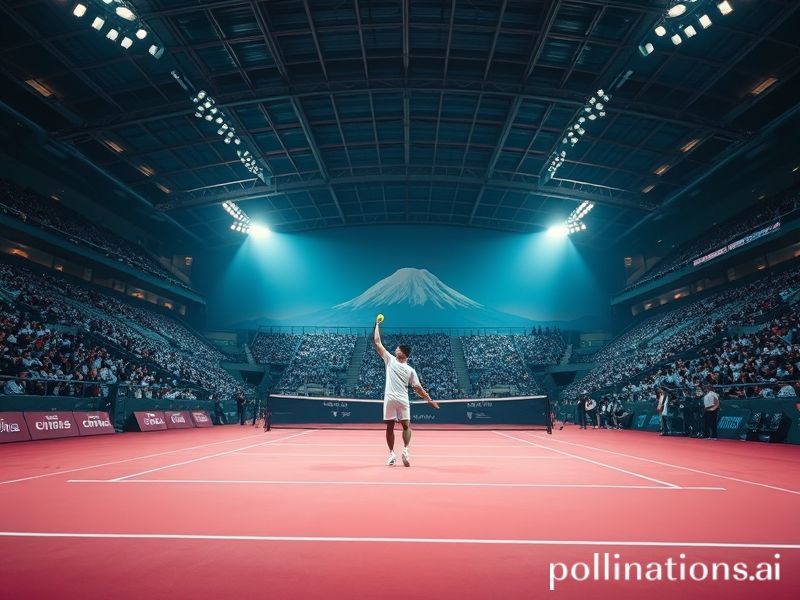Japan’s Grand Re-Opening: A Velvet-Rope Welcome to the Post-COVID World
Japan Opens Its Doors—Slightly—To the Rest of Us: A Dispatch from the Land of Polite Chaos
By Our Tokyo Correspondent, who has finally emerged from a two-year quarantine haze smelling faintly of vending-machine coffee
They say history repeats itself, first as tragedy, then as farce. In Japan’s case it repeated itself as paperwork: mountains of it, stamped three times, laminated, then bowed at. After 2½ years of “Closed for Renovations” signs hung on the national welcome mat, the archipelago quietly flicked the latch last month and allowed the first non-business, non-student, non-diplomatic humans to cross its borders since the pre-COVID halcyon days when “social distancing” was something you did to your in-laws. The event is being marketed domestically as the “Japan Open,” which sounds like a tennis tournament but plays more like an escape room designed by Kafka.
Cue the global sigh of relief so loud it rattled supply chains from Rotterdam to Rio. Airlines that had mothballed wide-bodies in the Arizona desert dusted off the cobwebs and remembered, with a jolt, that Japan is not merely the country that invented Pokémon and reliable sedans but also the world’s third-largest consumer of jet fuel and second-largest importer of European handbags. The yen, having spent the summer flirting with 150 to the dollar—a rate that converts every Tokyo latte into existential regret—suddenly found itself the belle of the carry-trade ball again. Hedge-fund bros in Mayfair popped champagne they pretended to understand.
Meanwhile, the rest of the planet is watching like a nosy neighbor who’s heard the couple next door finally stop yelling. South Korea’s travel agencies, starved of Japanese shopping sprees, re-hired the part-time aunties who know precisely which Osaka pharmacy sells the good eye cream. Australia’s rock-lobster exporters, who had been force-feeding their crustaceans to uninterested domestic cats, began reheating the cargo planes. Even the EU, which has spent the year perfecting the art of congratulating itself on Russian sanctions, suddenly remembered it still exports things that blink and beep and fit nicely into Akihabara display cases.
Yet for all the talk of “re-opening,” the gates are still fitted with polite velvet rope. Daily arrival caps hover like a mother-in-law’s judgment: 50,000 souls, give or take a honeymooning couple who didn’t fill out form 37-B correctly. Independent tourists are welcome—so long as they book through approved package tours supervised by guides trained to prevent the embarrassment of someone eating on the subway or, worse, blowing their nose in public. Think of it as Club Med with shame.
The broader significance, if one insists on such things, is that Japan’s experiment offers a live demonstration of what post-pandemic selective openness looks like. Rich countries are discovering that insulation felt rather pleasant: no stag-party Brits puking in Shibuya, no Instagram influencers dangling from Kyoto’s sacred torii. The electorate, aging faster than a banana in August, quite enjoyed the serenity. Now they must weigh nostalgia for empty temples against the cold hard calculus that their pensions are funded by tourists who believe Kit-Kats are a food group.
Globally, Japan’s tepid curtain-raise is the canary in the coal mine for every nation that treated COVID as an excuse to slam the shutters. The world’s middle powers are learning that re-entry is not binary; it’s a dimmer switch operated by bureaucrats who’ve grown fond of the quiet. Each visa form, PCR test, and mandatory app is a tiny tariff on human curiosity. The longer the friction persists, the more travelers—those fickle carbon-spewing creatures—will simply reroute to somewhere with fewer forms and cheaper beer. Turkey, Mexico, and even post-Brexit Britain have already built entire marketing campaigns around the slogan “We still let you in.”
So welcome back, sort of, to Japan: the country where the trains still run to the minute, the ramen still scalds the roof of your mouth, and the border police still wield the kind of soft power Stalin only dreamed of. Come for the cherry blossoms, stay for the lingering suspicion that you’re being gently but firmly managed. Just remember to bow, sanitize, and for heaven’s sake don’t blow your nose. The world may be open again, but courtesy remains non-negotiable—and non-refundable.







